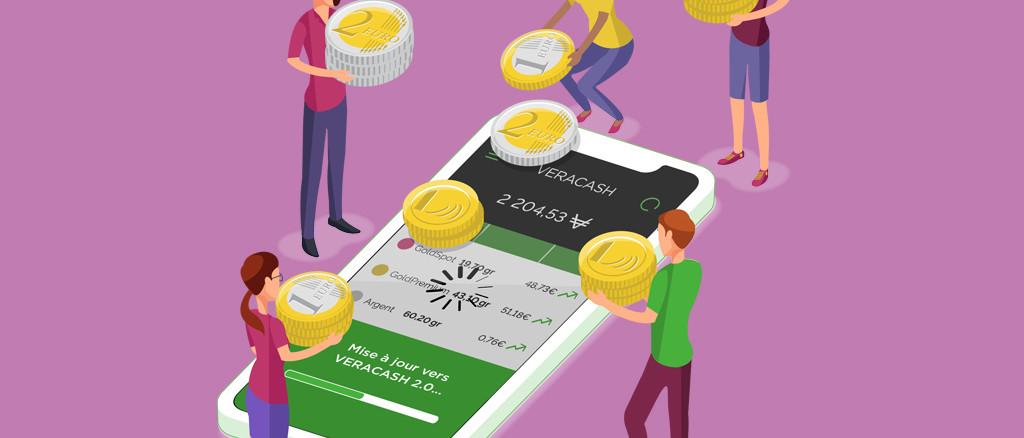Useful definitions
Fiat money is cash money, i.e. reserves of banknotes and coins whose value is based solely on the trust which is placed in them.
Bank money refers to the sums deposited in bank accounts. It circulates by means of bank payments, either via completely digitised methods (bank transfers, standing orders, direct debits and bank cards) or by cheque. When you withdraw funds from a cash machine, your bank money becomes fiat money.
The money supply is the total value of all monetary assets in circulation in an economy at any given time. It comprises various aggregates (M1, M2 and M3) that indicate the level of liquidity of economic agents.
Who creates money?
Money is ordered by central banks and produced by either state-owned or private banknote printing offices.
Reserves of banknotes and coin—fiat money—are currently dependent on the system of supply and demand. If commercial banks need liquid money for their transactions and their cash machines, they simply order it from central banks, against the value of their reserve accounts. It is important to bear in mind that money does not have its own intrinsic value, other than the paper on which it is printed, so it is relevantly unimportant if a bank’s reserve account is just a number on a computer screen or if it takes the form of tokens, because they still represent an asset for the bank. Its only value is the one attributed by the trust placed in it.
The money supply however is something altogether different. Governments and central banks can control the money supply by raising and lowering interest rates. For example, low interest rates encourage the creation of credit, or bank money, in practice increasing the money supply. Conversely, high interest rates discourage the creation of credit and so reduce the money supply.
In conclusion, it is important to realise that just 7% of the euro money supply is made up of banknotes in circulation, i.e. fiat money. As a result, more than 90% of transactions involve completely virtual bank money. The risk is that, if a bank run were to occur, you would undoubtedly have trouble withdrawing fiat (liquid) money using your bank card and, accordingly, would not have access to the money in your account.
The “printing press” effect: how do banks create money?
In case you didn’t know, money is created through the extension of credit. In other words, debt. This process of generating money through debt is what is referred to as money creation ex nihilo (“out of nothing”). 90% of the money issued by banks is nothing more than the acknowledgement of debt.
Many believe that customers’ deposits are used to finance credit. And while that was true for a time, it is no longer the general practice today. Banks create both money lent and money deposited, a process known as double-entry bookkeeping. When the bank records an asset (a loan) on its balance sheet, it must also record a corresponding liability (a debt). As a result, a deposit does not give rise to credit, but rather the opposite. And even if, once repaid, the initially created money is cancelled out, the interest still remains in the system. As economist Joseph Schumpeter put it, “It is much more realistic to say that the banks ‘create credit,’ that is, that they create deposits in their act of lending, than to say that they lend the deposits that have been entrusted to them”.
And if a loan is not paid back in full by the borrower, the bank repays itself, either by seizing the assets that the loan was used to purchase or by making a claim against the insurance paid for by the borrower in addition to the interest charged by the bank.
By means of these credit lines, the banks create deposits, which themselves create more credit via the banks’ capital. To illustrate this concept, just think of a snake biting its own tail, or the paradox of the chicken and the egg…
In short, debt is created out of nothing.
Money creation ex nihilo is an anomaly
For millennia, money was used merely as a means of exchange and communication. It was becoming sedentary and the state taking control of our money, now fiat money (from the Latin, ‘so it shall be’), that distanced us from that.
All fiat money is subject to manipulation by a small group of eminent individuals: their values rise and fall, soar and burst… And when a new revolutionary financial technology emerges, the same compromised traits are attributed to it.
Our money should not be an instrument of speculation. Our financial system should not be a gamble.
To show the impact [of compound interest] on money in the long run, we may use the famous example of Joseph’s cent invested at 5% interest in the year 0. In the year 2000 this cent would be worth over 500 billion balls of gold of the weight of the earth, at the price of gold in that year. Without the compounding of interest, the sum accumulated would have been €1.01.
– Margrit Kennedy, on the subject of compound interest
A central currency out of step with its users
It’s a fact: our central currency, the euro, is showing signs of weakness. After the wonderful promises of the early 2000s (low-interest loans, simplified trade, etc.), the reality today is less appealing.
Nowadays, some countries, such as Latvia, are seeing their population emigrating, thus decreasing by close to 15%, while others, like Greece, are finding themselves overindebted. In the past, the solution would have been to devalue their currency so that inflation could eat away at that debt, but now, with the eurozone, where a single currency is used by 19 different countries, that process is much more complicated.
Since the adoption of the euro, the most fragile countries have found themselves under a mountain of debt, inevitably dragging down those economies that serve as props for the rest, creating a house of cards that is bound to collapse.
How can we cope with this situation? There are two obvious solutions:
- All of the countries in the eurozone agree to merge into a single ‘United States of Europe’, which seems unlikely.
- Each country reclaims its financial independence and adopts a national currency specific to itself, which could be extremely costly.
But what if there was another solution? What if that solution did not come from our governments and our banks, which have proved time and again that they are light years away from understanding the financial reality of their people? What if the people could come up with their own alternative?
How can money creation be limited?
With the advent of cryptocurrencies and open-source money, it seems clear that these alternatives are capable of countering the phenomenon. Let’s not allow the richest 1% of the population decide yet again what should happen to these new means of exchange.
38% of French survey respondents think that gold could be a better currency than the euro, as:
- It provides savings security in the event of a crisis (63%)
- It is environmentally-friendly (60%)
- 56% of French survey respondents believe the euro is a currency that encourages financial speculation.
- 74% of French survey respondents who consider cryptocurrencies to be better than the euro would be interested in a gold-backed currency in addition to the euro.
- 71% of French survey respondents who consider cryptocurrencies to be better than the euro think that gold would be a better currency than the euro in the face of Bitcoin.
As proved by the OpinionWay survey for VeraCash®, the euro is perceived to be a currency which encourages financial speculation, and more than one-third (38%) of those French respondents believe that gold could be a better currency than the euro. The precious metal thus represents a real symbol of security.
However, in order to be attractive and usable on a daily basis, a new gold-based currency based should address the weaknesses in traditional currencies, such as issues relating to environmental conservation, while allowing the French populace to maintain their usual payment habits (virtual payments, in particular). This is precisely what VeraCash is striving to do: to provide a forward-looking currency that is viewed positively by its users and has strong values.
Brand & Content Manager chez Veracash.
Curieux de tout et en particulier d'Économie, de ses transformations et de l'impact qu'elle a sur nos sociétés.
Toutes les questions méritent une réponse, avec recul et pédagogie.
You might be interested in
5 January 2021
VeraCash is committed to fundraising to strengthen its reputation as an atypical neobank.
Don't pull your hair out! Because we know that our clients come to us mainly from the perspective of "nonbanking", we would like to reassure you…
1 October 2020
FinCEN Files: A swirl of revelations about banks and money laundering
FinCEN Files, the scandal making banks tremble. VeraCash reviews the abuses in the banking system and the systematic circumvention of regulations.
12 September 2019
Money Heist: A lesson on money from the Professor
What happens if the financial institution or the government should waver? The Professor is gambling on the assumption that the Bank of Spain will not…


